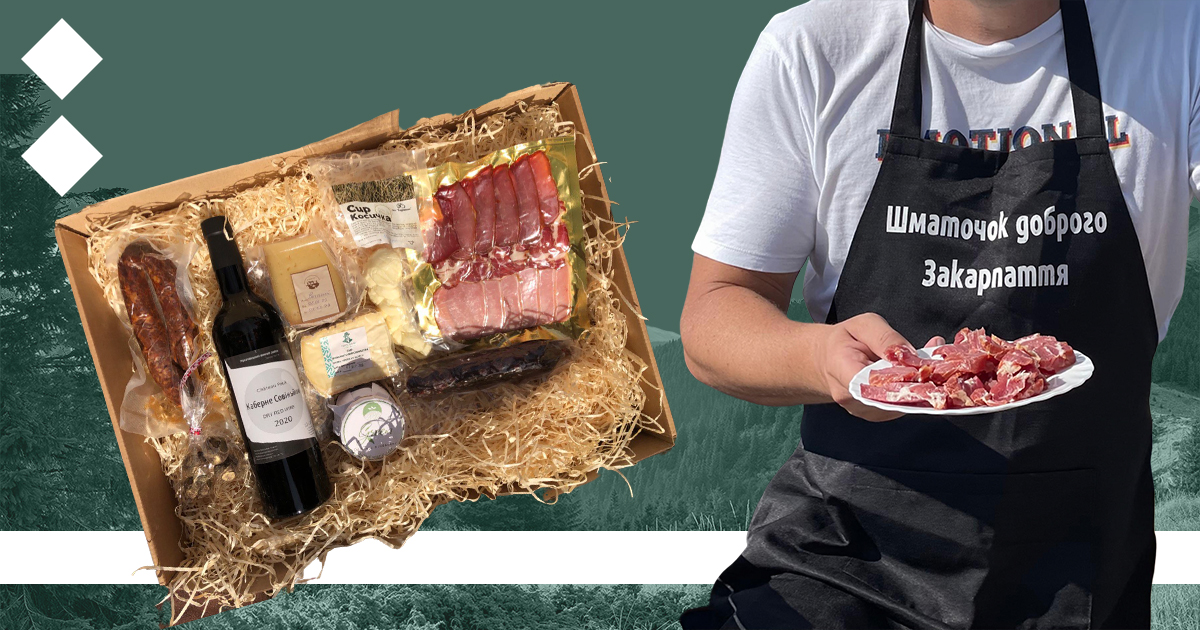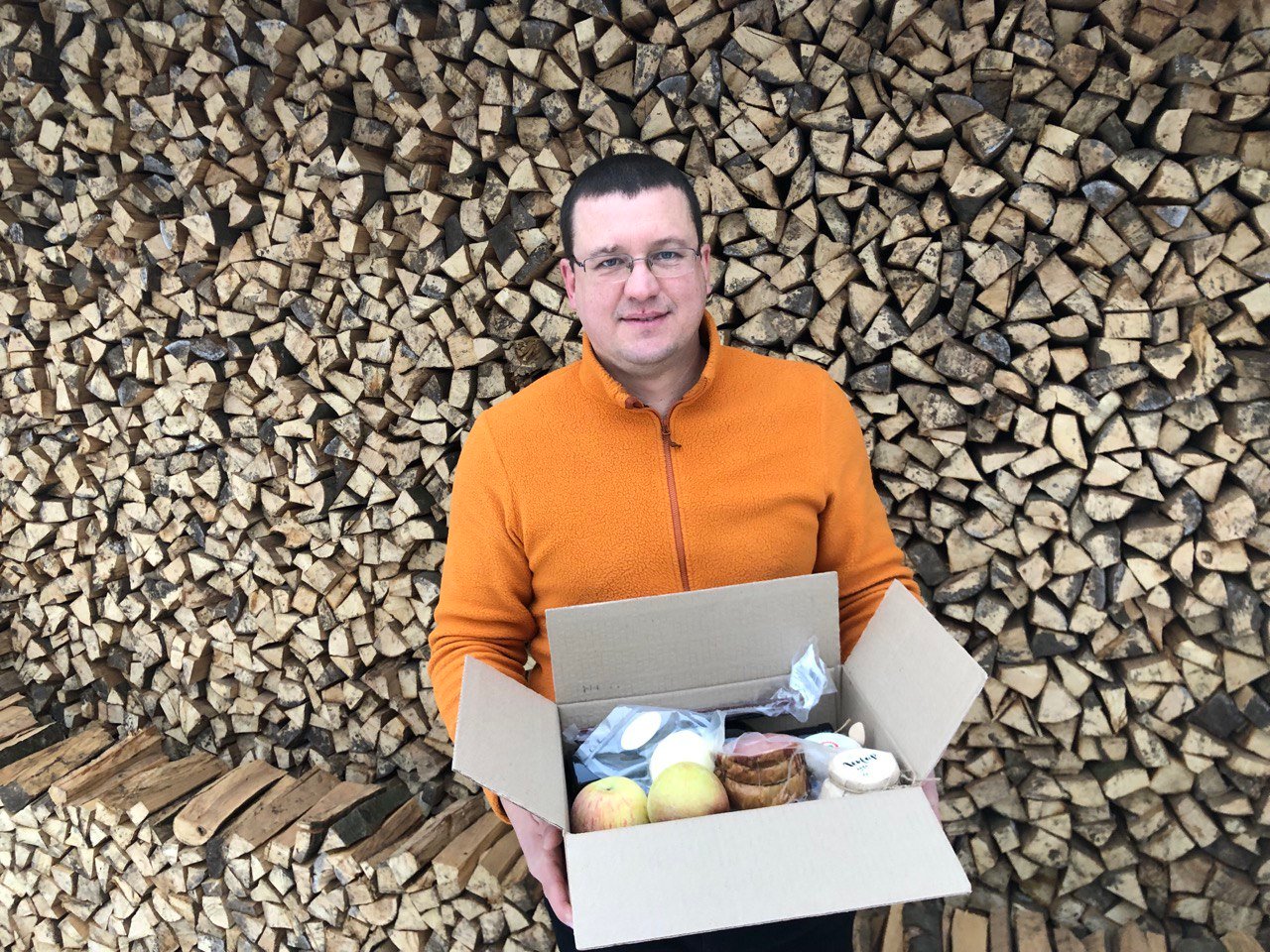In times of war, supporting small businesses and local producers is critical. Transcarpathian entrepreneur Viktor Stynych found a creative solution — creating a gastro subscription.


World statistics show that 80% of small businesses close in the first year of operation and 50% of the rest after five years. Today in Ukraine, war has been added to the traditional risks that small businesses, including the craft business, can expect. Lack of stability, winter blackouts, loss of established connections, and outflow of workers abroad — this is an incomplete list of Ukrainian crafters' problems during the war, even in the deep rear.
Ukrainian domestic producers do not give up despite all the obstacles. Each in their region supports the development of the economy and continues to produce high-quality and often unique local products.
Today, many Ukrainians would like to support craft producers. Unfortunately, such products are not often found in supermarkets and can only be purchased directly from the manufacturer. However, it is not so easy to contact most of them — not all even have websites for orders.
Viktor Stynych, a resident of Mukachevo in the Zakarpattia region of Ukraine's west, came up with an interesting way to deliver sets of craft products to everyone who loves Transcarpathian delicacies. Thanks to the Katran gastro project, he popularizes the tastes of Transcarpathia and supports local producers.


"I formulated three things I like — eating, drinking, traveling," Stynych shared with Rubryka how the idea of Katran was born.
Katran is a unique project for Ukraine. This is a subscription service — a monthly surprise parcel with craft Transcarpathian products (meat products, cheese, wine). If desired, you can order alcohol-free or vegetarian sets.
It all started with Stynich, who, after graduating, worked at various enterprises for about 17 years and began to look for ideas for his own business.
"Office work brought money, but it was tiring. Then I formulated three things I like — eating, drinking, traveling," Stynych shared with Rubryka. It was in these areas that he began to experiment. First, he tried himself in cheese making, then distillation, and later in brewing. "I liked traveling the most. As a result, six years ago, my first project appeared, called Travel."
The travel project developed well — it grew from an ordinary blog to a travel school, organization of conferences, and author's trips. All this turned into a popular club with a symbolic membership fee, but in 2020, the COVID-19 pandemic happened.
"I stopped understanding what value I give clients," continues Stynych. "Travels have become irrelevant. I decided to return to my old hobbies — delicious, eco, craft food. Only not as a manufacturer, but as a seller."
Katran sets include unique local products by various manufacturers of Transcarpathia
In June 2021, Stynich had an idea — monthly packages with delicious products of local origin. The main content of each box is Transcarpathian craft products that are unique and produced by different manufacturers. Such products hardly appear in stores, but you can buy them directly from the manufacturer. The name of the project, like its products, is also Transcarpathian. In the dialect, katran means the apron of the hostess.
Stynych adds: each package is a kind of surprise for the subscriber; its content is known in advance only in general terms. Besides, products in subscription boxes are often exclusive. These are products that even the manufacturer has only to order — for example, picnic (homemade sausage) with prunes. The manufacturer will put effort into order from one person, but a joint order for 100 kg will be interesting. There is a lot of fun in this category.
Another component is snacks. Something small, inexpensive, which no one expects and is not even on the list, but found a place in the box. A small and unexpected bonus. Some kind of sauce, jam, or local fruit. "Once, I bought 16 kg of nuts from an older lady. Good for her and some fun for Katran," explains Stynych.
The mission of the project is to support small producers in Transcarpathia.
"When I asked myself how to support Transcarpathian small producers, the answer was always the same — we need to buy their products. You can write a lot and worry about them, but only buying is real support. Imagine that a new manufacturer appears who is worried, experiments, and does not know what to expect from the future," Stynych continued. "If there are several hundred participants in Katran at this time, then it is worth making the first shipment — and everything will become much clearer."
That's how it turned out. In the first days, only 16 people signed up for the project. About 600 surprise packages were sent the next month, which turned into orders for small producers.
Katran sets have three sizes — S, M, and L.
After the launch, Katran did not stand still but expanded the ways of supporting local producers. Clients very quickly led Stynych to understand that, in addition to subscriptions, there should be one-time shipments, say, as a gift to someone, and packages without wine or meat. Over time, special thematic sets appeared, including for the benefit of the Ukrainian army. "Usually, people's needs push me to experiment," Stynich says.
Katran sets have three sizes — S, L, and XL. The price of each set corresponds to the retail costs of the crafters. For each package, the project's author adds a description to the parcel, which contains the manufacturers' phone numbers, so if the customer particularly likes something, they can order it directly from the manufacturer. This is also an important mechanism for supporting small craft businesses in the project — this is how manufacturers expand their customer base.
Stynych is constantly looking for new suppliers, but does not cooperate with everyone, trying to find those who differ in their assortment and taste
Stynych himself likes to taste local products and does not miss any opportunities. This passion introduced him to the manufacturers who became the first suppliers of the Katran project. If he and his friends explored little-known corners of Transcarpathia in the "Travel" project, now he is constantly researching little-known crafters.
Stynych is constantly looking for new suppliers. He quickly found all the famous people or those with social networks. He had heard of some manufacturers but couldn't find their contacts, so he was asking those who might know, and then word of mouth made its deal. "For example, yesterday, I received a phone call from a winemaker whose products I wanted to get to know, but no one knew his contacts," Stynych shares.
Stynych always asks his readers, residents, and entrepreneurs whom they know in their region. It also works well when he asks winemakers about cheesemakers, cheesemakers about butchers, and butchers about winemakers. "They are not competitors," Stynych shares life hacks.
There are many craft producers in Transcarpathia. According to Stynych, he is personally acquainted with more than 40 cheesemakers — this is more than in the specialized association. However, many cheesemakers on polonynas, montane meadows in the Ukrainian Carpathian Mountains, are still not included in his list. There are about 60 winemakers and hundreds of butchers in Transcarpathia.
However, the founder of Katran does not cooperate with everyone but tries to find those who differ in their assortment and taste.
Stynych believes that working on a personal brand is incredibly important for small manufacturers.
"I always believed that an entrepreneur has only one problem — insufficient sales," Stynych notes. "Everything else is relatively easy to solve. Many small entrepreneurs limit themselves in the market size and do not work on sales. One of the ideas of Katran was precisely to support them with orders and not with virtual help."
According to the project's founder, small producers often lack an understanding of the power of a personal brand, the power of local patriotism, and the drive to look for new sales opportunities every day. Sometimes it rests on personal character traits and worldview, so everything remains unchanged:
"Some entrepreneurs cannot solve the issue of vacuuming products for a year. There are manufacturers from whom I have been waiting for samples for many months, and realizing that there are too many risks with such a manufacturer," says Stynych.
The founder of Katran stresses that sales and customer feedback should come first. To find your audience, he recommends a simple but time-consuming way — to write one post about your activities every day on social networks. This will gather interested people around the product, make the entrepreneur look for new topics for posts and their worldview, and create expertise.
The ability to experiment is another way to increase the maker's audience and stand out from the army of other crafters. From time to time, Stynych urges the butchers he meets and works with for adventures. For example, to prepare salami with plum liqueur or jamon or to start work with dried and aged sausages.
"So far, it is not often possible because butchers are incredibly conservative," laughs Stynych. "There are only two or three in all of Transcarpathia who are ready to complicate their lives for the sake of taste, and one of them is French."
"No one promised it would be easy," adds the entrepreneur.
Katran parcels often become a consolation for the receiver.
"Now, when everyone is at a distance, Katran becomes an opportunity to take care of your own. It's hard for me to put it into words, but I often feel that Katran helps people be closer to each other. Sometimes they order from abroad, for example, for those currently in the east of Ukraine. Correspondence with such senders is always very emotional and poignant," Stynych shares.
Surprise packages are often a consolation. From time to time, on his Facebook page, Stynych publishes reviews and all sorts of strange stories about the Katran boxes.
"For example, once an episodic subscriber wrote: 'Viktor, you sent me a box by mistake.' I say: it's not a mistake — this young lady ordered you a gift," Stynych says. A person's mood is changed immediately.
In addition, the entrepreneur notes another moment that he did not expect at the beginning of the project. Katran began to gather family and friends around the table. "This is very valuable nowadays," the entrepreneur admits.
From the first days of the Katran project, its founder decided it should be completely Transcarpathian — not only products in boxes from Transcarpathian producers but all other materials for the project.
For example, they found a manufacturer in Mukachevo to produce boxes — people with visual impairments work in the production, and the labels are produced in Uzhhorod, another city in western Ukraine.
A few months ago, Stynych decided to make a Khersonian Katran to collect the products of Kherson manufacturers to support them with orders and cash. The complete picture of the project's expansion has not been completed yet, because not everyone gets in touch, and some do not already have production — the Russians destroyed many Kherson factories. Part of the Kherson region is still occupied. The entrepreneur wrote a post on Facebook about those who were found. If you would like to support Kherson crafters, now you know how.
Українські міста постають перед величезними труднощами у відновленні своїх інфраструктур та економік. Багато з них… Читати більше
Українське військо потребує людей, але не завжди охочі долучитися до війська знають, де і як… Читати більше
Не просто “виживати”, а й бути бадьорими без кави — цілком реально, переконують фахівці зі… Читати більше
Тернопіль впроваджує інноваційний “портфоліо” підхід до міського розвитку, обравши курс на “зелену” трансформацію. Цей досвід… Читати більше
Футбол — більше, ніж просто гра. У “Виходь грати!” футбол це не про змагання, перемоги… Читати більше
Миколаїв, прифронтове місто з багатою історією суднобудування, сьогодні долає виклики війни — обстріли, дефіцит води… Читати більше
Цей сайт використовує Cookies.